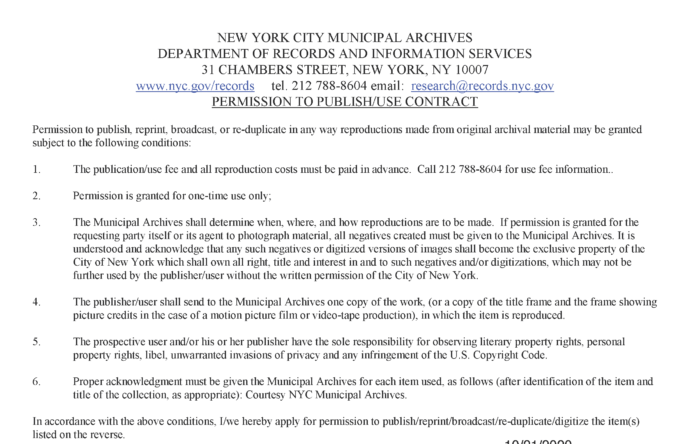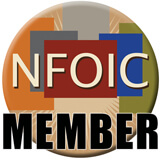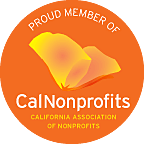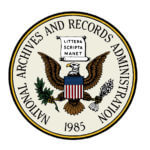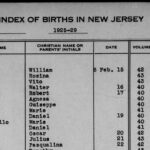PUTTING THE BIG APPLE’S BIG RECORDS ONLINE FOR EVERYONE
Faced with an unbelievably ridiculous attack on public records access in New York City, we’re taking matters into our own hands: we want to get the contents of the New York City Municipal Archives and put all the records online ourselves — FREE, FOREVER
Genealogists have just about had it with New York. Even for the kinds of quiet, conflict-averse nerds who actually enjoy digging through probate files, who have become inured to dealing with some of the most restrictive rules on historical public records access in the whole country, it seems like this month, October 2020, was when it all finally boiled over. Nights of emergency Zoom meetings, days of public comments — the New York genealogist, historian, and researcher community is beyond mad right now. And they have every right to be.
And we at Reclaim The Records want to tell you that story, and how we are starting to fight back against this government greed gone amuck.
Earlier this month, the New York City Municipal Archives did something unusually dumb. They announced a revision to their rules that would require all Archives researchers and patrons to request and obtain the Archives staff’s “permission” in order to use or re-use any images or historical records that they hold, even if those public records are very old or are entirely in the public domain. The Archives didn’t specify how or why this “permission” would or would not be granted, nor how to appeal if it were somehow not granted. Furthermore, the Archives says that researchers must then pay the Archives a blanket “licensing” fee for the use or re-use of those public records it holds, far above any actual copying costs, even for educational, scholarly, or non-profit use.
In other words, this taxpayer-funded public archive wants to limit your right to use, re-use, or re-publish every historical public document that you might ever want to obtain from them, in your articles or presentations or books or movies. If you’re a professional genealogist, they want to limit how you may legally re-transmit those records that you already bought to your client, or to a court if you’re working on a legal proceeding, or to a foreign government’s consulate if you’re working on a dual citizenship project. They even want to take ownership of any new scans or photographs that you might have made of those public records. They even have the nerve to ask you hand over copies of your new photo negatives to them, and then assign the rights to those negatives to the City of New York! And then as the cherry on top of the sundae, they want to you pay them extra for the right to do all this, too.
Don’t believe us? Well, check them out for yourself.
And the really crazy thing is that these revised rules aren’t even that much better or worse that the absolutely bonkers “contract” the Archives already hands out to people who want to use Archives materials! Go, read those conditions and bullet points slowly, but ideally not while you’re drinking a beverage.
That “contract” comes straight from an official New York City Municipal Archives e-mail account. We got tipped off to this scam of theirs about a year ago, when we heard through the genealogy grapevine that a researcher from Australia had reached out to the Archives over e-mail, asking them (although he legally had no real need to ask) if he could please make a scan of a 1906 NYC birth certificate for a minor celebrity and then add that new image to that person’s page on Wikipedia. The Archives actually told him he’d have to pay them if he scanned and posted the more than century-old public record he already had. And not that it should even matter for a non-copyrighted and very old totally public record, but Wikipedia is also, of course, a famously free non-profit website, not a commercial use.
We later found out that this wasn’t an accident or a one-off mistake. It was a policy, a dumb one. And the Archives’ attempts to revise that policy this month are now just making it more obvious to everyone that something is very wrong here. We know of no other public government archive, neither city nor state, in the entire United States that would dare have the chutzpah to attempt something so brazen. Only in New York!
Just to be really clear, almost all of these historical records held in the New York City Municipal Archives are government-created records, are in the public domain, were never copyrighted, and are likely legally unable to be copyrighted. They’re usually records that came directly from other government agencies, including even federal government agencies, some of which are long-defunct. Some of the records are fifty or a hundred or several hundred years old. Some of the records even predate the founding of the United States itself! They’re public records of our shared history, paid for by our taxes and our ancestors’ taxes. No one owns them, and no one ever will — or alternately, one could say that we all own them.
But the New York City Municipal Archives has apparently decided that nah, they control all those records, forever.
That’s just nuts
It sure is! And researchers and genealogists, especially those who do a lot of work involving old New York City records, are understandably outraged. In the Archives’ official public meeting about this rule change, held via videoconference on October 23rd, and through the City’s official Rules web portal, many people have given their testimony and made their very eloquent complaints known to the City. For example:
- The New York Genealogical and Biographical Society (the NYG&B) created an excellent explanatory webpage about the “licensing” issue on their website, and you can also read their president Josh Taylor’s official public comment about the matter.
- The International Association of Jewish Genealogical Societies (IAJGS) also wrote a very good letter in opposition to the rule, well worth reading for its specific details.
- Even the nice people at FamilySearch, who are famously polite, submitted their own official letter of protest to the City over the situation. The best line in it: “You cannot license public records any more than you can license the use of the alphabet.”
- And last but certainly not least, our own Reclaim the Records board member Alec Ferretti went so far as to compose and recite a series of limericks (!) for his official testimony at the public meeting. It was well-received by everyone who didn’t work for the City.
As far as we can tell, not one person who spoke at the public meeting, and not one person or organization who has submitted a public comment online, has been in favor of the new Archives policy — except for the Archivist.
What the heck does the Archives think it’s doing?
So far, the Archives has tried to handwave away all this criticism and uproar. They claim that these new “permissions” and “licensing” fees are like, totes normal, you guys, why you all so salty? They have instead attempted to raise two terrible defenses.
Their first claim, which the Archives has now said repeatedly, both verbally (including at that official public hearing) and in e-mail correspondence, is that none of these permission and licensing requirements were ever meant to apply to records being used for personal family history. However, that’s literally not what their own rules, which they authored, say. Now, that may be how they currently choose to interpret their own rules, but that doesn’t mean they can’t change that interpretation at any time in the future, and then yank the rug out from under everyone. If this is a public comment period on new rules, should they not heed the public’s overwhelming request for clarity in the actual wording of their own agency rules?
The Archives also claims that they have never charged for the use of “family history” records in the past, which as you can see from that guy-in-Australia-with-a-1906-birth-certificate-copy-on-Wikipedia e-mail chain we posted before, is clearly untrue. And in any case, they also seem to include only actual vital records (births, marriages, deaths) as the sole category in their imaginary “family history” rules carve-out. But what about all the researchers who use other historical public records also held at the Archives, like old tax records or the 1890 New York City “Police Census” or the Almshouse records, in their family research? Why should they need to ask special permission, or pay a dime for use beyond a reasonable one-time copying fee?
Secondly, at the public meeting, the Archives specifically cited the example of the nearby New York Public Library as a place that has similar licensing agreements and contracts required for the public use of their holdings, the implication being that requiring these permissions and then charging high fees for records access is just a normal and established precedent, and archives do it all the time, no big deal.
Of course, there’s just one little problem with that: the New York Public Library kind of isn’t a real public library, despite its name. They’re actually a private non-governmental non-profit corporation, originally created by the well-heeled Astor, Lenox, and Tilden families, which acts in partnership with the City of New York. More importantly, the NYPL’s holdings are explicitly not subject to the New York State Freedom of Information Law (FOIL).
The New York City Municipal Archives, though, is a real public agency, part of the New York City Department of Records and Information Services (DORIS), and its holdings most certainly are subject to FOIL. Heck, we dragged them to court twice in the past six years to prove that exact point to them! And FOIL clearly caps the allowed fees for the duplication of government-held public records, limited to the actual costs of duplication. And of course, the whole reason FOIL exists in the first place is to make it clear that the American people are allowed, with limited and enumerated exceptions, to view and copy government documents, without needing to first justify their intended use case to the government agency. That’s why it’s called the Freedom of Information Law, not the Freedom of Information Suggested Policy If We Feel Like It Today And If We Approve Of How You Will Use The Documents Now Pay Us An Extra Hundred Dollars And Give Us Your Photo Negatives Too.
In short, everything the Archives is doing and claiming here is all legally-unsupported malarkey. But so far, the Archives seems stubbornly unwilling to back down from their position and fix their rules, despite the public outcry. This stinks, this really stinks. What can we do?
The Genealogists Strike Back
Well, we at Reclaim The Records are fighting back in a big, big way. And we’re purposely choosing to do it in a way that will be impossible for the Archives to ever undo, no matter what kinds of new contracts they may draft in the future, or what kinds of new permission slips they say researchers are required to submit, or what new fees they want to impose on public access to public documents.
Last night, October 29th, we at Reclaim The Records formally launched the first of what will be many Freedom of Information requests (and probably many resulting lawsuits) asking for copies of the Archives’ files. And we mean we are going after alllllll the files at the Archives, image by image, file by file, records set by records set. We are no longer willing to leave these important historical documents solely in the hands of agencies who have shown, through their repeated bad actions, that they only want to control and profit from exclusive access to our shared history. We don’t trust them, and we want our public records back safely, and freely, in the hands of the public.
We are starting off this fight with a big new FOIL request for every single record that the New York City Municipal Archives has ever already digitized or scanned, regardless of whether or not those files were ever previously published online. Digital records are subject to FOIL, just as physical records are. So we are asking for full, unredacted, unwatermarked, full-size, high definition versions of everything they already have, and also all the text metadata and databases that go with them, delivered to us on hard drives. We’ll pay for the drives, of course, and for the shipping; that’s only fair. But since the files are already digital, and can be easily copied, that’s about it. No permissions, no licenses, just pay what the law requires and no more.
What does this mean? Well, for the majority of casual genealogists, this is the main thing:
Reclaim The Records is going to get every single digitized New York City birth certificate, marriage certificate, marriage license, and death certificate that the Archives currently has in its possession, and we are going to put them all online for free public use, without any restrictions, costs, paywalls, subscriptions, or copyrights.
This will mean that all of the genealogy websites you know and love, both commercial and non-profit, large and small, as well as individual researchers or teachers or journalists or anybody, will finally have access to download and re-upload and re-publish every single historical New York City vital record, for free. Millions and millions of them! And unlike the Archives, we won’t have any dumb “Mother, May I?” permission slips or shady licensing fees to line our pockets. It’s all gonna be free, forever.
Here is the text of the three-page New York State Freedom of Information Law (FOIL) request that we at Reclaim The Records submitted to the Archives last night. (Internally, we nicknamed this one the “Release the Kraken!” FOIL, for obvious reasons.)
The best part of all? In the past few years, the Archives has undertaken a multi-million dollar digitization project for the old NYC vital records, to finally scan them all in high definition and in color. If you were a patron sitting onsite in the Archives building in lower Manhattan — and alas, no one is right now, due to the pandemic — you could freely pull up these gorgeous new color scans on the Archives’ own computer system, or by connecting your personal laptop to their public WiFi. That means the new scans are public records, too.
But they’ve never gone online anywhere openly before, at least not these nice new versions. About forty years ago, FamilySearch did sign a contract with the Archives to get the right to make microfilm copies of the old black-and-white microfilms of these New York City birth, marriage, and death certificates. But then a few years ago, the Archives suddenly threw a big ole hissy fit, and refused to “let” FamilySearch continue to display their own images of their own legally-scanned microfilms on their own website. This restriction has had the effect of forcing researchers around the world to have to physically trek down to a limited number of Family History Centers during limited operating hours (or no operating hours at all, during the pandemic) to use their computers or their WiFi networks, just to see the old black-and-white images of New York City vital records — which, again, are public documents.
Furthermore, the Archives has very recently taken possession of decades of a different type of vital record, the three-page New York City Clerk’s Office marriage licenses, which are a totally different record set than the two-page Health Department marriage certificates. We at Reclaim The Records are actually indirectly responsible for that record set being de-accessioned to the Archives in the first place (you’re welcome!), because we won two separate lawsuits against the New York City Clerk’s Office in 2016 and in 2018 for the index to those marriage licenses. This spurred the City Clerk’s Office to finally hand over some of their older materials to the Archives. Those three-page marriage licenses were never available from anyone before, not even on the old FamilySearch microfilm reels, but they too have now been scanned in color over the past few years, although the work on this set is not completely done yet.
And all these vital records, the lovely new color high-definition versions, are going to go online for free just as soon as we get them. Forever.
Of course, you’ll still have to go through the Archives directly if you want to get a certified paper copy of a vital record, as the records we’re seeking will just be considered uncertified “informational” digital images. That’s fine, though, because for most people, especially genealogists, we don’t actually want or need legally-certified documents just to look up a relative’s name or find out the name of a cemetery where a great-great-uncle was buried.
But first, before we get too far ahead of ourselves, we have to go fight and win this new FOIL request, and the “Article 78” petition (lawsuit) it will probably spawn. But we’ve done that successfully with city agencies before, several times, including twice against this particular agency! So we’re not very worried about it.
If all goes well, we’re probably looking at winning the lawsuit and receiving the digital files by late 2021 or early 2022. It’s something to look forward to, in a coming year that we all hope will be better than this year.
We have not yet begun to fight
And this is just the beginning. We’re not just going after all of the Archives’ already-digitized image files and their associated text metadata. That’s because, of course, so very many of the wonderful holdings of the Archives were never scanned or photographed or transcribed in the first place.
Lots of these Archives records only exist on old microfilm reels. And so we at Reclaim the Records will also be making multiple new FOIL requests over the coming years (yes, years!) for some crucial microfilms that have never before been available outside of New York City. We’re looking at record sets like the “delayed and special birth certificates” for people who were born in New York City in the late 19th and early 20th centuries, but who did not have (or could not locate) original birth certificates and had to apply at a much later date, often because they needed Social Security or wanted to join the military during World War II.
We’re also looking at various other important record sets, whether they’re large data sets like the index to old NYC District Attorney case files, or even small one-reel or or two-reel series, like the listing of all New York City born and Puerto Rico born US soldiers who died during the Spanish-American War. There are a lot of interesting records in those vaults, and we want to get them all, digitize them, and throw them up online, bit by bit.
Fun fact: two years ago, we actually managed to get the first-ever mostly-complete list of every microfilm reel held at the Archives. We did it through a big separate FOIL request, back in March 2018, which did not require a lawsuit but did necessitate lots of painful back-and-forth e-mails to pull the data out of the Archives after they kept “forgetting” to include information about their own holdings. You can read it all here, if you like. If they were a competent government agency, the Archives would probably have a “here’s a big list of all our microfilm holdings” page somewhere on their own website, and then we could all just look at it — but they aren’t and they don’t, and hence all the tedious bickering.
We at Reclaim The Records are also thinking about what kinds of records are being held in the vaults at the Archives that have never been photographed or scanned or microfilmed, and which would be wonderful to preserve and put online before they crumble into dust. These old records are legally subject to New York FOIL too, although many precautions would need to be taken due to their fragility. For example, existing FOIL Advisory Opinions from the New York State Committee on Open Government indicate that an agency can mandate that no flash be used during the photography, or that only an experienced vendor may handle the old paper, which are certainly reasonable conditions. We’re not filing this kind of “we want paper records!” FOIL request just yet, but we will in the coming years.
(And you guys and all of your historical organizations can all file these kinds of fun records requests, too! Come join the fun! In fact, a little birdie told us that a certain well-known genealogy organization just filed their very first Freedom of Information request, asking for public copies of certain historical files. We’re so proud! But we’ll let them announce the news when they’re ready to go public.)
We also want our money back
We at Reclaim The Records are also busy planning a wholly new type of lawsuit against the Archives, a groundbreaking tactic that our organization has never used before, and one that we think probably no group in America has ever used against any government archive or library before.
See, we don’t want to just get the records back, although we do love records! But we also want to get researchers’ money back, for all the “licenses” they should never have had to pay to the Archives all these years, for all the public records the Archives does not own and has never owned — and will never own. Profiting off selling things you don’t own isn’t just gross, it’s fraud. And it’s especially gross when an official agency of the government does it to the public, and does it knowingly.
And we’ll have much more to say about that fun new project early next year. ?
And speaking of money…
You guessed it, this is the part where we ask you for donations to help support our work. And as you can see, we have a whole lot of work ahead of us, projects that will take years to see through.
But we have a habit of doing just that, and not letting these things drop, and of holding government agencies to account for their actions. Whether it’s suing Missouri and proving that they broke their own law knowingly and purposefully, or even taking on the US National Archives itself, we think big, and we get it done. And your continued support means we can keep hiring our awesome attorneys and planning new ways to go reclaim our records.
From all of us at RTR, thank you for your support! It means a lot.
UPDATE, February 2022:
Roses are red / violets are blue / on Valentine’s Day / we decided to sue.
After waiting almost exactly a year for a yes-or-no response to our FOIL request that never came — even though the law requires that an agency provide such a reply within twenty days — our attorney sent a letter to the Commissioner of DORIS on October 22, 2021, asking to appeal our request, since the lack of reply is equivalent under the law to a denial.
The Commissioner of DORIS wrote back to our attorney on October 26, 2021 saying that they had not in fact denied our request, they just hadn’t bothered to answer it yet, and they would quite soon. (They did not.)
And so on February 14, 2022, Valentine’s Day, we sued the New York City Municipal Archives for the fourth time in eight years, to try to reclaim more public records for the public.
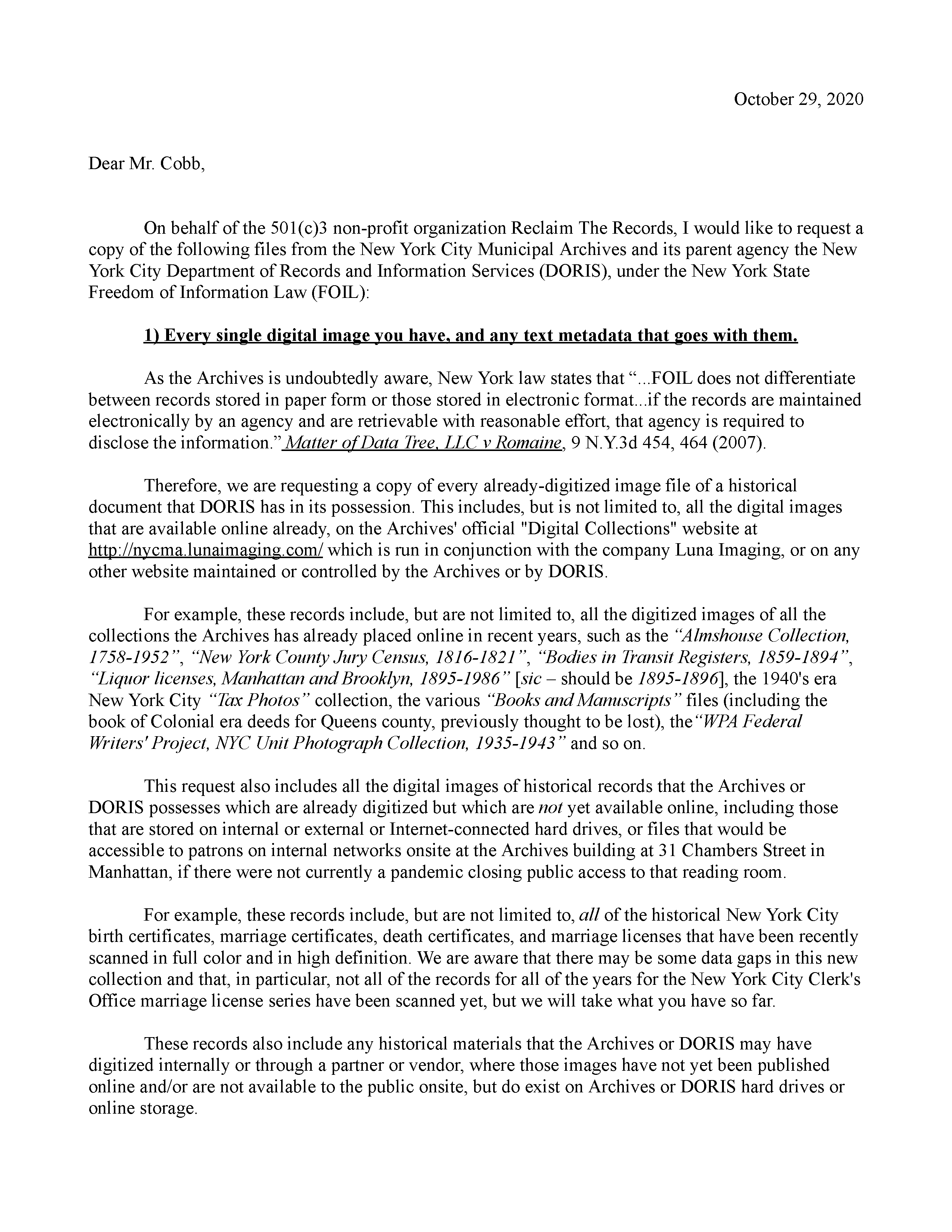
Our FOIL request (October 29, 2020)
The full text of our three-page Freedom of Information Law (FOIL) request to the New York City Department of Records and Information Services (DORIS), parent agency of the New York City Municipal Archives
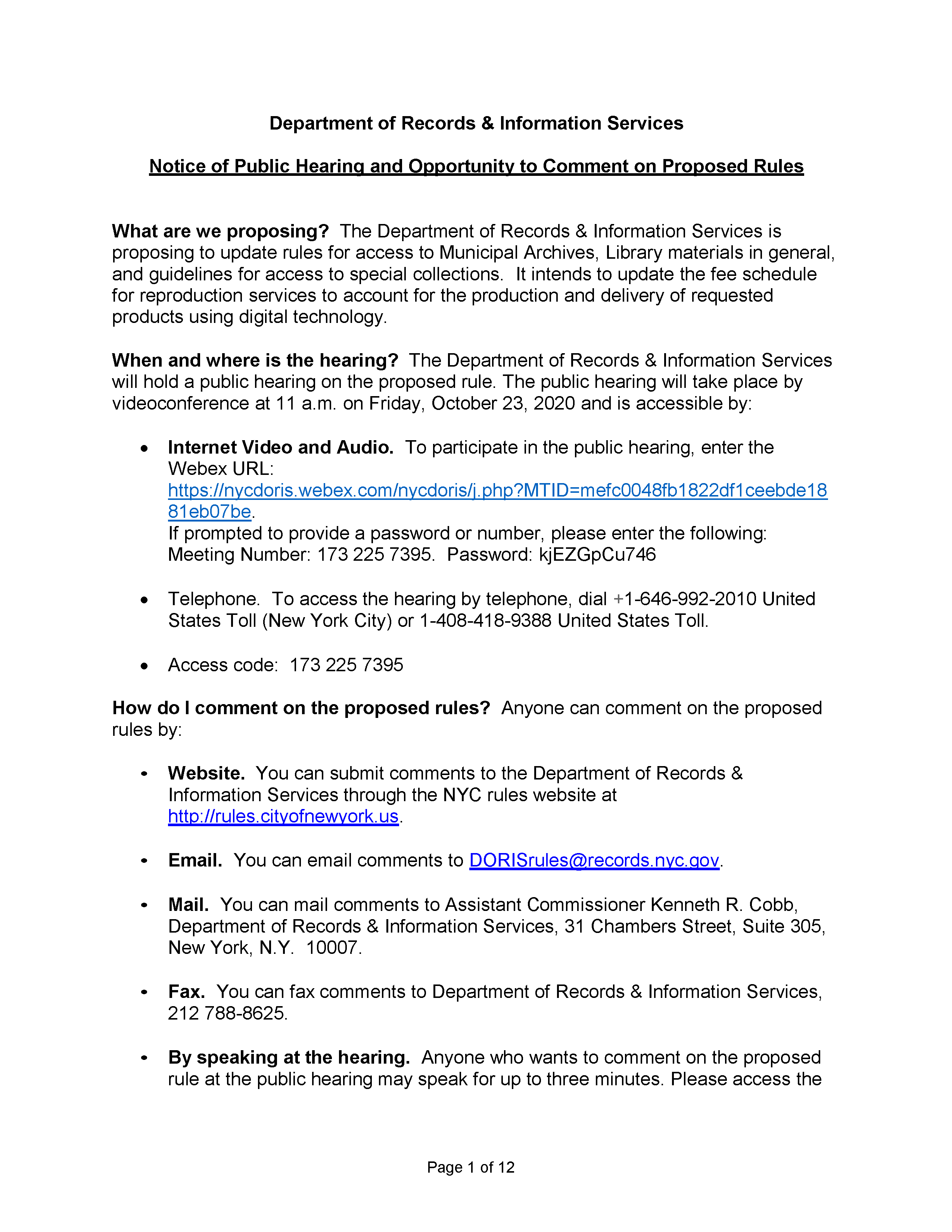
DORIS' proposed updates to their rules (October 2020)
Here's the full twelve-page PDF which mysteriously disappeared from the city website right as public comments started to flood in against it. Luckily, we had saved a copy in the Internet Archive's Wayback Machine...
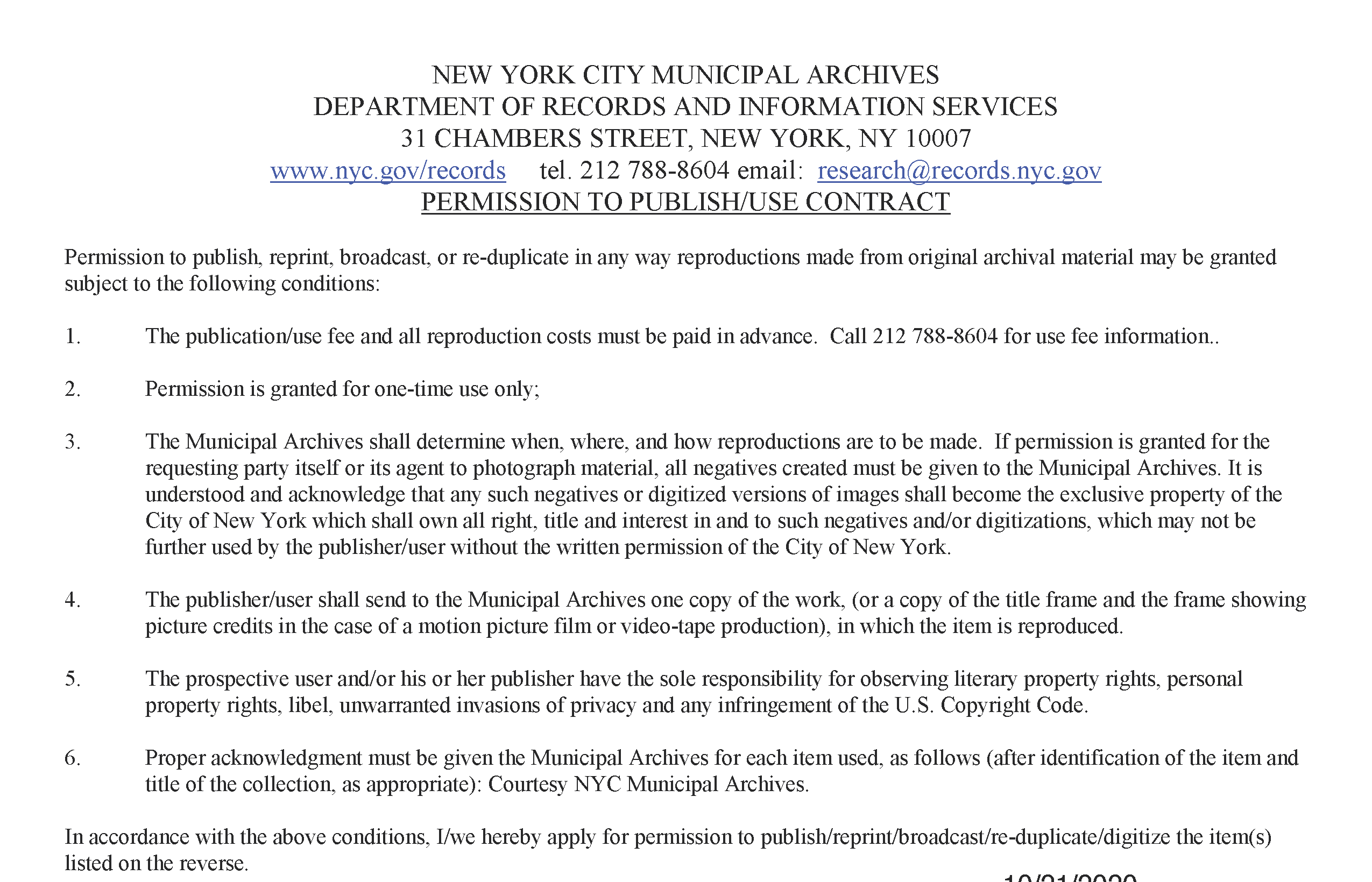
The text of DORIS' existing "contract"
This is the top part of DORIS' existing "Permission to Publish or Use" contract. It's preeetttttty darn nuts. (Check out the part where they make you hand over the negatives of any photos you took!)
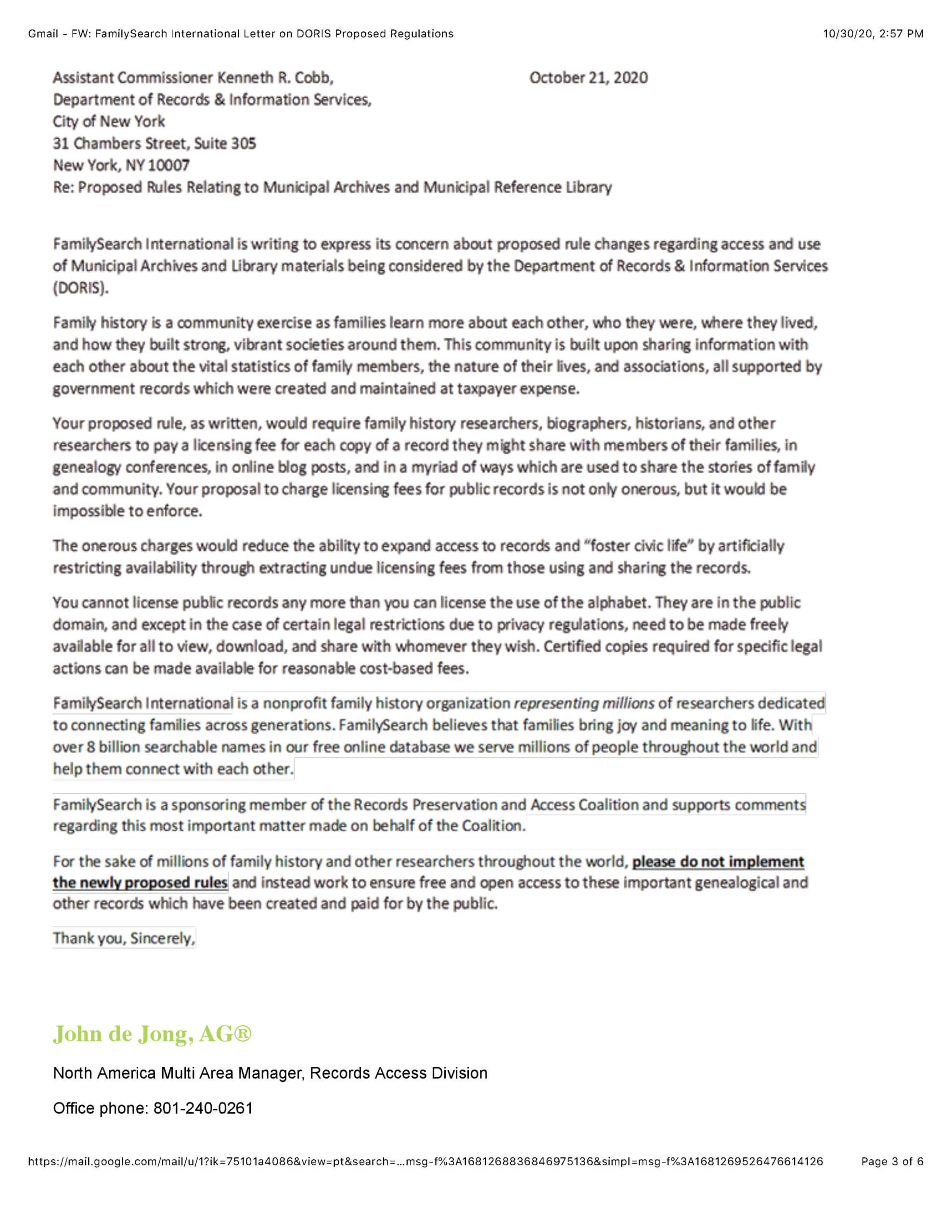
FamilySearch's letter (October 21, 2020)
Even the mild-mannered folks at FamilySearch wrote and submitted an official public comment against DORIS' proposed rules
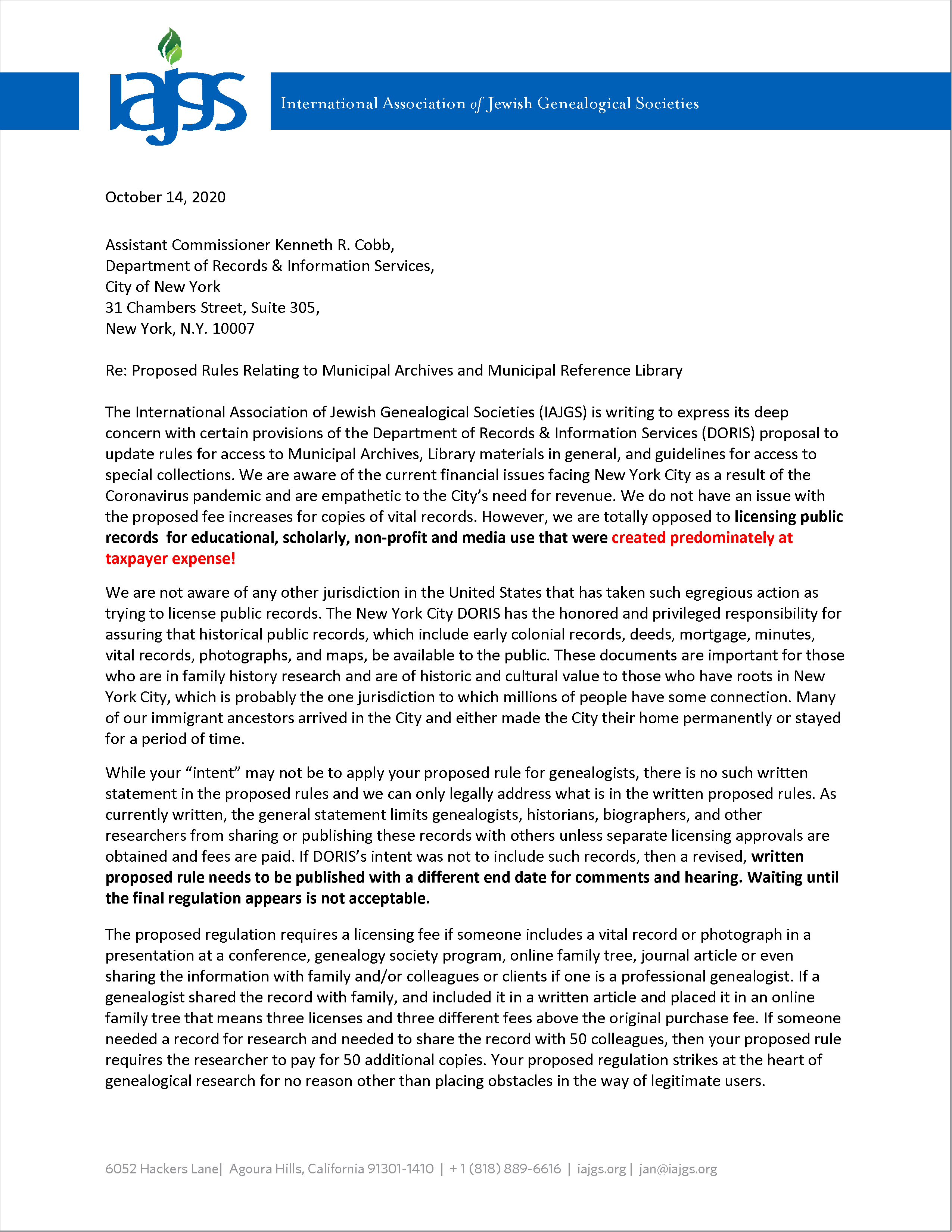
IAJGS' letter (October 14, 2020)
The International Association of Jewish Genealogical Societies (IAJGS) also submitted an official public comment against the proposed rules
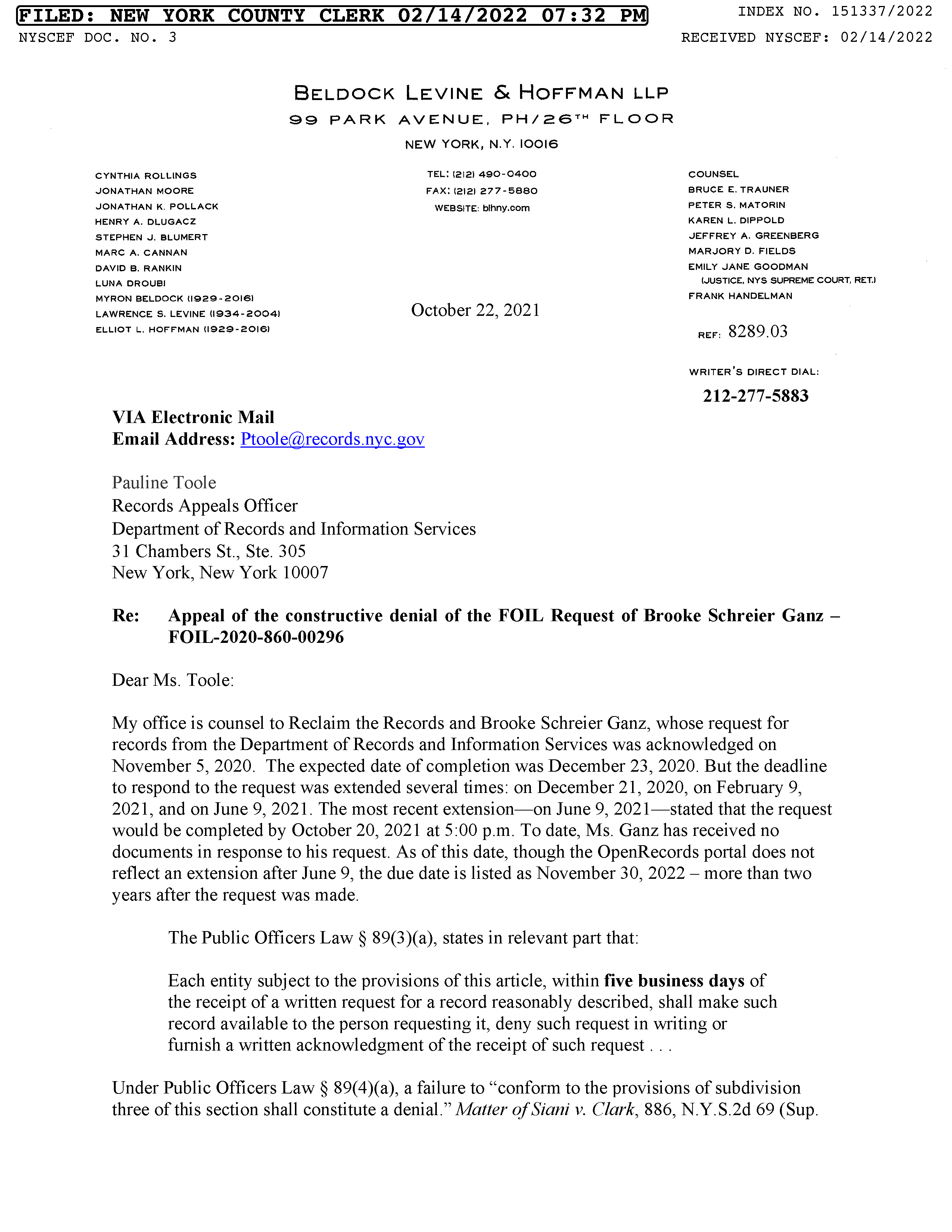
Our official FOIL Appeal (October 22, 2021)
Almost exactly one year after waiting for some kind of yes-or-no-answer to our FOIL request, our attorney filed a FOIL Appeal with the Commissioner of DORIS
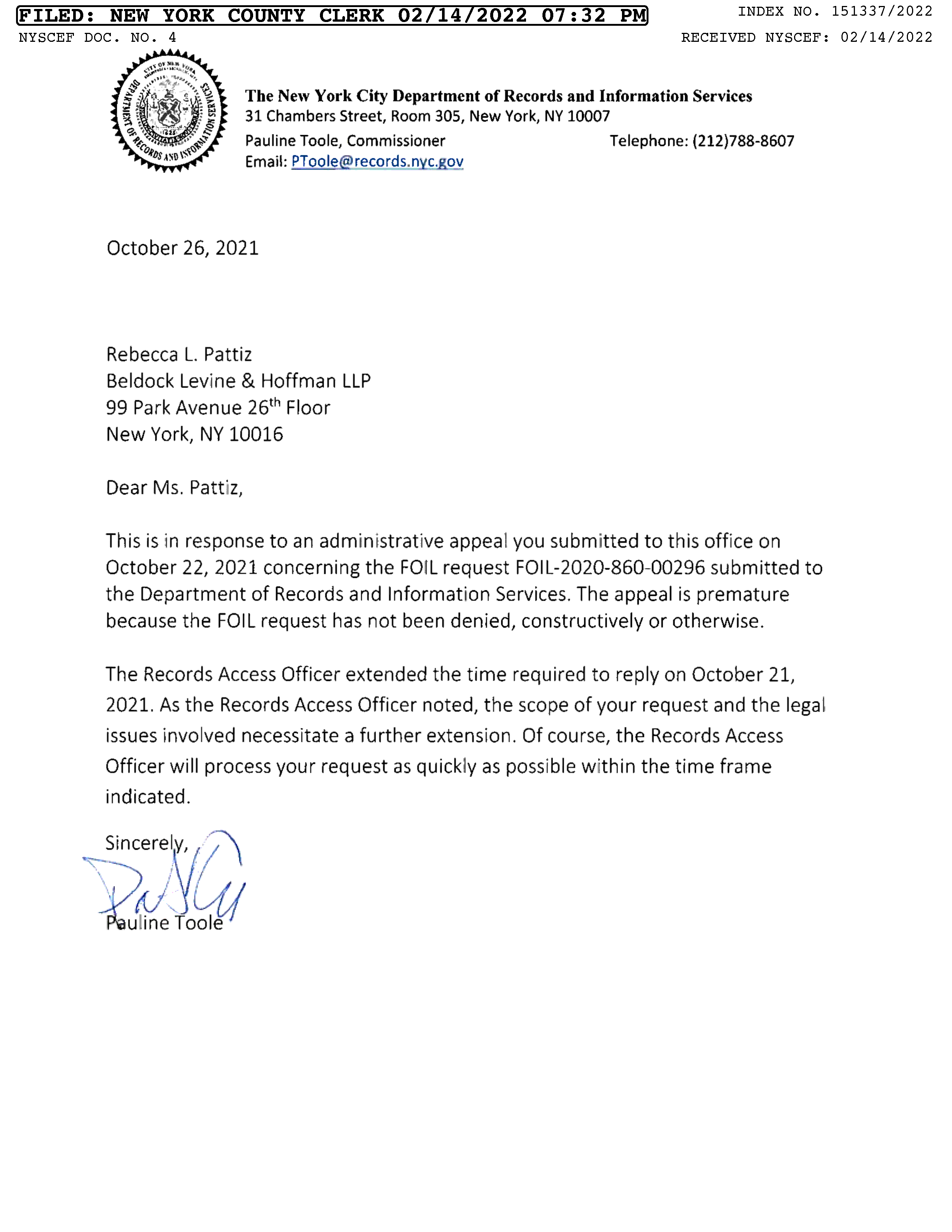
Pretending An Appeal Was Not An Appeal (October 26, 2021)
The Commissioner wrote back and said that they hadn't actually denied our FOIL request, they merely hadn't answered it in a year and would do so eventually. (They did not.)
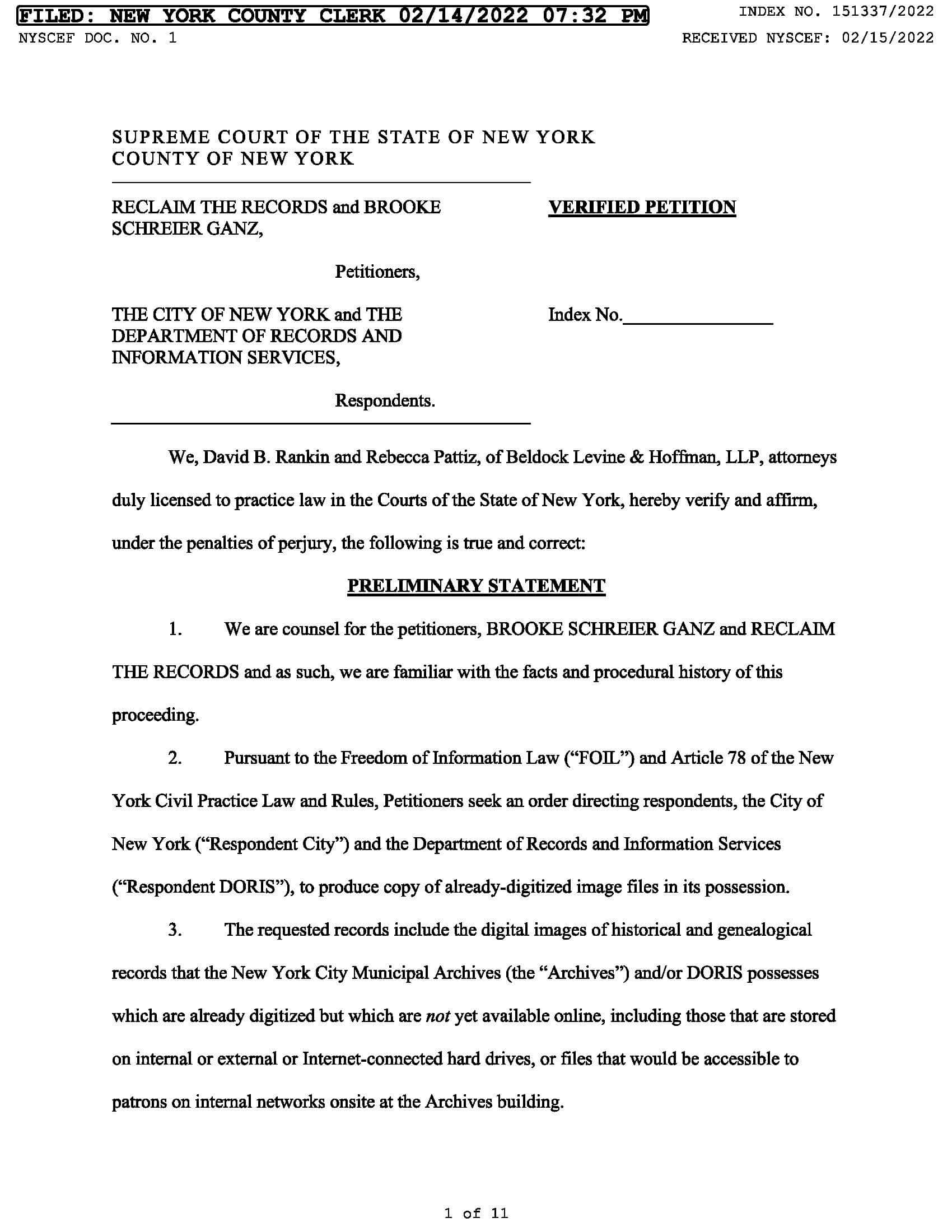
Our Article 78 Lawsuit (February 14, 2022)
Roses are red / violets are blue / for Valentine's Day / we decided to sue. Here's our "Verified Petition", which we filed on February 14, 2022.
State or Vital Records Jurisdiction: New York City
Archive or Library: New York City Municipal Archives
Government Agency: New York City Department of Records and Information Services (DORIS)
Law: New York State Freedom of Information Law (FOIL)
Record Type: Birth Records · Burial Records · Death Records · Education Records · Marriage Records · Military Records · Photographs · Slavery and Manumission Records · Tax Records · Voter Records
Record Years: late seventeenth century to mid twentieth century
Record Format: Actual scanned documents and photographs
Record Physical Format: Digital images and digital text metadata
Number of Records (Estimated): Unknown millions

